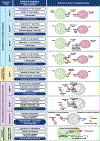Emerging therapeutic strategies for enhancing sensitivity and countering resistance to programmed cell death protein 1 or programmed death-ligand 1 inhibitors in non-small cell lung cancer
- PMID: 36848319
- PMCID: PMC11234508
- DOI: 10.1002/cncr.34683
Emerging therapeutic strategies for enhancing sensitivity and countering resistance to programmed cell death protein 1 or programmed death-ligand 1 inhibitors in non-small cell lung cancer
Abstract
The availability of agents targeting the programmed cell death protein 1 (PD-1)/programmed death-ligand 1 (PD-L1) immune checkpoint has transformed treatment of advanced and/or metastatic non-small cell lung cancer (NSCLC). However, a substantial proportion of patients treated with these agents do not respond or experience only a brief period of clinical benefit. Even among those whose disease responds, many subsequently experience disease progression. Consequently, novel approaches are needed that enhance antitumor immunity and counter resistance to PD-(L)1 inhibitors, thereby improving and/or prolonging responses and patient outcomes, in both PD-(L)1 inhibitor-sensitive and inhibitor-resistant NSCLC. Mechanisms contributing to sensitivity and/or resistance to PD-(L)1 inhibitors in NSCLC include upregulation of other immune checkpoints and/or the presence of an immunosuppressive tumor microenvironment, which represent potential targets for new therapies. This review explores novel therapeutic regimens under investigation for enhancing responses to PD-(L)1 inhibitors and countering resistance, and summarizes the latest clinical evidence in NSCLC.
Keywords: drug resistance; immunotherapy; neoplasm; non-small cell lung cancer; programmed cell death protein 1; programmed death-ligand 1; tumor escape.
© 2023 The Authors. Cancer published by Wiley Periodicals LLC on behalf of American Cancer Society.
Conflict of interest statement
CONFLICT OF INTEREST STATEMENT
Liza Villaruz reports consulting fees from AstraZeneca, Bristol-Myers Squibb, Celgene, Daiichi Sankyo, Janssen, Jazz, and Takeda. George Blumenschein reports grants/contracts from Amgen, AstraZeneca, Adaptimmune, Bayer, BeiGene, Bristol-Myers Squibb, Celgene, Daiichi Sankyo, Exelixis, Genentech, GlaxoSmithKline, Immatics, Immunocore, Incyte, Kite, MacroGenics, MedImmune, Merck, Novartis, Regeneron, Repertoire Immune Medicines, Roche, Sanofi, Tmunity Therapeutics, Torque, Xcovery, and Verastem; consulting fees from AbbVie, Adicet, Amgen, Ariad, AstraZeneca, Bayer, BeiGene, Bristol-Myers Squibb, Celgene, Clovis, Daiichi Sankyo, InstilBio, Genentech, Genzyme, Gilead, Janssen, Lilly, Maverick Therapeutics, MedImmune, Merck, Novartis, Regeneron, Roche, Sanofi, Tyme Oncology, Virogin Biotech, and Xcovery; data safety monitoring board/advisory board participation with Maverick Therapeutics and Virogin Biotech; stock and/or stock options with Virogin Biotech; and other financial/nonfinancial interests with Johnson & Johnson/Janssen. Gregory Otterson reports institutional grants/contracts from AbbVie, AstraZeneca, Bristol-Myers Squibb, Elevation Oncology, Genentech, Merck, Pfizer, and Revolution Medicines; payment and/or honoraria from OncLive; and data safety monitoring board/advisory board participation with BeiGene and Novocure. Ticiana Leal reports consulting fees from AstraZeneca, Bayer, Beyond Spring, Blueprint Medicines, Boehringer-Ingelheim, Bristol-Myers Squibb, Daiichi Sankyo, Eisai, EMD Serono, Genentech, Invision First-Lung, Janssen, Jazz, Lilly, Merck, Mirati, Novocure, Roche, Takeda; and payments and/or honoraria from Aptitude Health, ASTRO, Cardinal Health, Curio, Georgia Society of Clinical Oncology, GRACE, i3Health, Medscape, Nexium Oncology, OncLive, Peer View, Targeted Oncology, Opinions In Lung Cancer, SITC, Vindico, and Wisconsin Association Hematology/Oncology.
Figures

Similar articles
-
[Real-world study on the efficacy and prognostic predictive biomarker of patients with metastatic non-small cell lung cancer treated with programmed death-1/programmed death ligand 1 inhibitors].Zhonghua Zhong Liu Za Zhi. 2022 May 23;44(5):416-424. doi: 10.3760/cma.j.cn112152-20210709-00504. Zhonghua Zhong Liu Za Zhi. 2022. PMID: 35615798 Chinese.
-
PD-1/PD-L1 Blockade Therapy in Advanced Non-Small-Cell Lung Cancer: Current Status and Future Directions.Oncologist. 2019 Feb;24(Suppl 1):S31-S41. doi: 10.1634/theoncologist.2019-IO-S1-s05. Oncologist. 2019. PMID: 30819829 Free PMC article. Review.
-
Safety and Efficacy of PD-1/PD-L1 inhibitors combined with radiotherapy in patients with non-small-cell lung cancer: a systematic review and meta-analysis.Cancer Med. 2021 Feb;10(4):1222-1239. doi: 10.1002/cam4.3718. Epub 2021 Jan 19. Cancer Med. 2021. PMID: 33465302 Free PMC article.
-
Therapeutic Implications of Tumor Microenvironment in Lung Cancer: Focus on Immune Checkpoint Blockade.Front Immunol. 2022 Jan 7;12:799455. doi: 10.3389/fimmu.2021.799455. eCollection 2021. Front Immunol. 2022. PMID: 35069581 Free PMC article. Review.
-
SBRT combined with PD-1/PD-L1 inhibitors in NSCLC treatment: a focus on the mechanisms, advances, and future challenges.J Hematol Oncol. 2020 Jul 28;13(1):105. doi: 10.1186/s13045-020-00940-z. J Hematol Oncol. 2020. PMID: 32723363 Free PMC article. Review.
Cited by
-
The expression of miR-21, HSP90a and gGASP-1 in serum of patients with lung cancer and their correlation with pathological subtypes.J Med Biochem. 2024 Jun 15;43(4):460-468. doi: 10.5937/jomb0-48051. J Med Biochem. 2024. PMID: 39139173 Free PMC article.
-
Long‑term survival of a patient with advanced lung cancer treated with targeted therapy and anti‑PD‑1 immunotherapy as multi‑line therapy: A case report.Oncol Lett. 2023 Nov 22;27(1):32. doi: 10.3892/ol.2023.14166. eCollection 2024 Jan. Oncol Lett. 2023. PMID: 38108071 Free PMC article.
-
Novel Tetrahydropyrido[3,4-d]pyrimidines as HPK1 Inhibitors for Treating Cancer, Inflammatory, and Autoimmune Diseases.ACS Med Chem Lett. 2024 Jan 31;15(3):318-319. doi: 10.1021/acsmedchemlett.4c00023. eCollection 2024 Mar 14. ACS Med Chem Lett. 2024. PMID: 38505843 Free PMC article.
-
PET-based immunomapping of intratumoral CD4+ cells to monitor acquired resistance to checkpoint inhibitors.Sci Adv. 2025 Jun 27;11(26):eadw1924. doi: 10.1126/sciadv.adw1924. Epub 2025 Jun 25. Sci Adv. 2025. PMID: 40561008 Free PMC article.
References
Publication types
MeSH terms
Substances
Grants and funding
LinkOut - more resources
Full Text Sources
Medical
Research Materials

